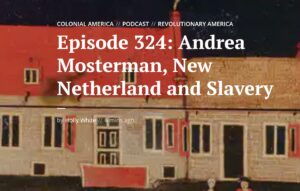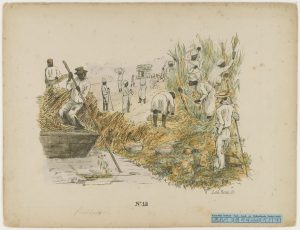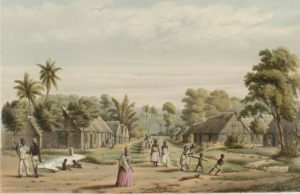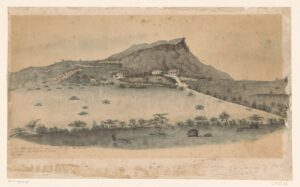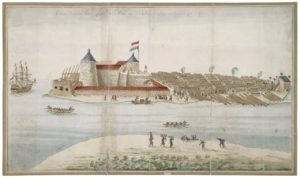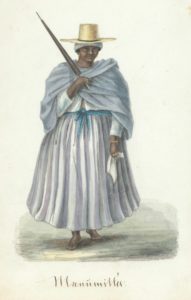Andrea Mosterman features in episode 324 of the podcast Ben Franklin's World. The episode is called "New Netherland and Slavery." She discusses how the colony of New Netherland took shape, and the ways how the West India Company and private persons used enslaved labor to develop the colony. … [Read more...]
Sources about Slavery – 1.9 Million Records Online
Important archives about slavery, including the role of the Dutch in the slave trade and enslaved people in Dutch colonies, have been digitized over the past years. 1.9 million scans have now become available from institutions in the Netherlands, England, Guyana, and Suriname. The sources can be accessed from a new page at the website of the National Archives of the Netherlands. The National Archives has digitized the following record groups relating to slavery: Dutch Series … [Read more...]
Symposium Sources of Slavery and Slave Trade
Do you want to learn more about researching enslaved ancestors or the slave trade? A free symposium on 23 April 2021 with various lectures will discuss the research possibilities in archives and practices for museums. A panel will reflect on increased accessibility and possible uses of sources relating to slavery. The symposium is organized by the Rijksmuseum, National Archives, and Royal Library of the Netherlands and will be in English. Where: Online (link provided an hour before the … [Read more...]
Slave registers of Curacao now available online
The slave registers of Curacao (1839-1863) and the emancipation registers of Curacao (1863) are now available via the website of the National Archives of Curacao and National Archives of the Netherlands. … [Read more...]
Quick tip – Trace enslaved people by their owners
If you are researching enslaved people in the former Dutch colonies like Suriname and the Netherlands Antilles, you need to trace their owners. Enslaved people created few records themselves, but their owners may have created records that mention them. Here are some examples of records created by owners that may include enslaved people: Last wills, disposing of slaves or stipulating their manumission Estate inventories, where slaves are included as property Notarial records … [Read more...]
Dutch term – Slavenhandel
Slavenhandel is the slave trade. The Dutch West India Company was heavily involved in transporting slaves. They had an outpost in Elmina on Africa's Gold Coast, where they gathered the enslaved people bought or captured in Africa. Ships would sail from Amsterdam with merchandise to buy slaves on the local slave markets in Africa, from where they would bring them to the West Indies or New Netherland. On the way back, the ships brought the proceeds from the colonies, such as sugar, tobacco, and … [Read more...]
Dutch term – Vrij
Vrij means "free," as in freedom. You may encounter the word vrij in different contexts in genealogical records: A vrije persoon [free person] was someone who was not enslaved and who was not a serf. A vrij goed [free property] was a property (typically a farm) that did not have feudal obligations. Vrij van belasting [free of taxes] means that no taxes were levied on the goods. … [Read more...]
Three old people ago…
One old person ago... Women did not have equal rights. Women in the Netherlands got the right to vote in 1917. But until 1956, married women needed permission from their husbands to enter into any legally binding contracts. Two old people ago... Slavery was legal in the Dutch colonies of Suriname, the Netherlands Antilles, and the Dutch East Indies. Slavery was abolished in the East Indies in 1860 and in Suriname and the Antilles in 1863. Even then slaves were required to continue … [Read more...]
Dutch term – Mulat, Mesties, Casties, Poesties, Testies
The Netherlands was involved in the slave trade from the late 1500s to the early 1800s. In the Dutch provinces, chattel slavery was outlawed, but it was common in the Dutch colonies such as Curacao and Suriname. In the colonies, slavery was abolished in 1863. In these Dutch colonies, specific terms were used to indicate the race of enslaved and freed people of color. These terms are offensive to our modern ears but understanding the meaning of these terms can be a vital clue to understanding … [Read more...]
Crowd funding needed for Suriname Slave Registers
A crowd funded project will digitize and index the slave registers of Suriname, making them freely accessible online. Slave registers of Suriname The slave registers of Suriname are a unique record series. They record the names of approximately 80,000 people who were enslaved in Suriname between 1830 and the abolition of slavery in 1863. I don't think there is another country in the world that had such a comprehensive registration of its enslaved … [Read more...]
